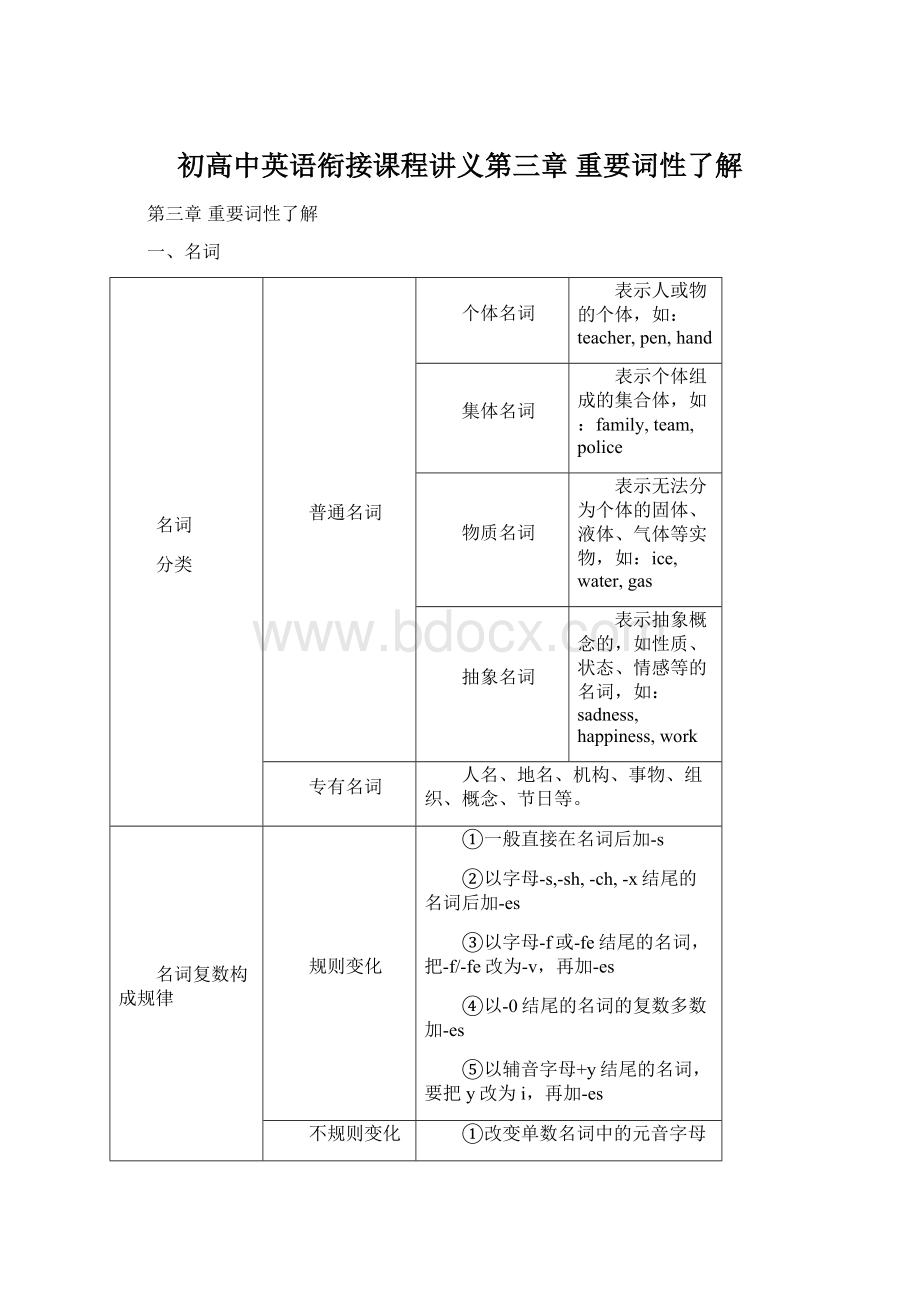初高中英语衔接课程讲义第三章重要词性了解Word文档格式.docx
《初高中英语衔接课程讲义第三章重要词性了解Word文档格式.docx》由会员分享,可在线阅读,更多相关《初高中英语衔接课程讲义第三章重要词性了解Word文档格式.docx(16页珍藏版)》请在冰豆网上搜索。

①一般直接在名词后加-s
②以字母-s,-sh,-ch,-x结尾的名词后加-es
③以字母-f或-fe结尾的名词,把-f/-fe改为-v,再加-es
④以-0结尾的名词的复数多数加-es
⑤以辅音字母+y结尾的名词,要把y改为i,再加-es
不规则变化
①改变单数名词中的元音字母
②单复数形式相同,如:
sheep,deer,fish,means
③表示某国人的名词的复数形式因习惯不同而各异
a.单复数形式相同(多以ese结尾),如:
Chinese,,Swiss
b.词尾加-s(多以-an结尾),如:
Americans,Koreans,Indians
c.将man变成men,将woman变成women,如:
Englishman-Englishmen
④其他形式,如:
mouse—mice,child-children
名词所有格
加-’s/-s’
①名词单数形式,用-’s,表示,如:
thegirl’sbooks
②复数形式,用s’表示,如Teachers’books
注:
所有格后所接名词表示地点时候,地点名词可省略。
如:
thedoctor’s
③复合名词在最后的名词后加’s,如brother-in-law’sbooks
④表示时间、距离、重量、国家、城市,地点无生命的名词也可用’s形式来表示其所有关系,如:
threedayswalk
借助介词of
无生命的物体的名词所有格常用of表示。
thecoverofthebook
双重所有格
由’s所有格和of所有格组合修饰名词,如:
anoldfriendofTom’s
二、代词
种类
人称
人称代词
物主代词
反身代词
第一人称
I,we,me,us
my,our,mine,ours
myself,ourselves
第二人称
you
your,yours
yourself,yourselves
第三人称
we,he,she,it
his,her,its,hers,theirs
himself,herself,
itself,themselves
指示代词
this,that,these,those,such,thesame
不定代词
all,both,neither,none,either,each,many,few,little,another,much,one,ones,some,any以及no-/some-/any-/every-+body/one/thing
疑问代词
who,whom,whose,what,which
相互代词
each,other,one,another,eachother’s,oneanother’s
Exercises:
1.Hereisthethathisyoungerbrotherlovesbest.
A.coffeecupB.coffee’scupC.cupofcoffeeD.coffeeofcup
2.Mr.Tonyalwayshastotellhisstudentsatthebeginningofhislectures.
A.somegoodpiecesofnewsB.somepiecesofgoodnews
C.somegoodpieceofnewsD.somepieceofgoodnews
3.Asabusinessman,Mr.LigainedhisbysellingfamousofEnglishandAmericanwriters.
A.wealth;
workB.wealth;
worksC.wealths;
worksD.wealths;
work
4.Heisakind-heartedman.Peoplecangetonwellwithhim.
A.FewB.AlittleC.QuiteafewD.Little
5.Thepostofficeisn’tfarfromhere.It’sonlybicycleride.
A.halfanhours’B.anhourandahalfC.halfanhourD.halfanhour’s
6.ThepopulationofShanghaiverybigandmostofitspopulationnativepeople.
A.are;
isB.is;
isC.are;
areD.is;
are
7.—Wouldyouliketohave,Tom?
—No,thanks,lhavehadenough.
A.anymoreorangeandapplesB.somemoreorangesandapples
C.anymoreorangesandapplesD.somemoreorangesandapple
8.—Whichdoyouprefertodrink,orcoffee?
—,please.
A.teas;
TwoteaB.tea;
TwoteaC.tea;
TwoteasD.teas;
Twoteas
9.ltwasreallytogetapresentfromhimonherbirthdaypartythatshecouldn’tbelieveit,lookingathimin.
A.suchbigsurprise;
asurpriseB.suchabigsurprise;
surprise
C.sobigsurprise;
asurpriseD.suchbigsurprise;
10.Thesearebikes.Thetwinbrotherslikethemverymuch.
A.Jack’sandJerry’sB.Jack’sandJerryC.Jack’sandJerryB.JackandJerry’s
11.—Howmuchwateristhereinthebottle?
—.You’dbettercometofetchanotherbottle.
A.AlittleB.NothingC.NooneD.None
12.Billworksharderthaninhisclass.Heisthemostexcellentstudentlhavemet.
A.theotherboysB.otherboysC.anyboyD.anotherboy
三、形容词
一、成分
成分
例句
定语
OneofthemostcommonlanguagesusedforcreatingwebpagesiscalledHTML.
Whoisthegreatestwomanwriteraliveintheworld?
表语
Aftergettingherhaircut,shelookedevenmorebeautiful
宾语补足语
Withthewindowopen,manythingsintheshopwerestolenatnight.
状语
Thebirdfellontotheground,dead.
二、比较级
此外,初中还安排了形容词比较级、最高级的语法点学习。
其变化规则如下表:
规则
原级
比较级
最高级
单音节形容词在词尾加-er;
-est
high
few
higher
fewer
highest
fewest
以字母e结尾的形容词在词尾加-r;
-st
large
wide
larger
wider
largest
widest
以重读闭音节结尾的形容词,末尾只有一个元音字母加一个辅音字母结尾,应先双写该辅音字母,然后加-er;
thin
big
hot
thinner
bigger
hotter
thinnest
biggest
hottest
以辅音字母加y结尾的形容词,须先将y变成i,然后加-er;
happy
funny
happier
funnier
happiest
funniest
多音节形容词前加more变比较级;
加themost变最高级
beautiful
interesting
morebeautiful
moreinteresting
themostbeautiful
themostinteresting
部分不规则的形容词变化如下表:
原级
good
better
best
bad/ill
worse
worst
many/much
more
most
little
less
least
far
farther/further
farthest/furthest
old
older/elder
oldest/eldest
三、具体用法
1、只能修饰形容词原级的词very,quite,so,too.例如:
Heistootiredtowalkon.他太累了以至不能再继续走了。
MybrotherrunssofastthatIcan’tfollowhim.我弟弟跑得那么快以至我跟不上他。
2、含有as…as(与…一样)的原级表达句式。
例如:
TomisasoldasKate.汤姆和凯特年龄一样大。
TomistwiceasoldasKate.汤姆的年龄是凯特的两倍。
TomrunsasfastasMike.汤姆和迈克跑得一样快。
【注意】
1、否定形式notas…as也可以用成notso…as“不如……不及……。
”例如:
Hedoesn’twalkasslowlyasyou.他走路不像你那样慢。
Thisroomisnotas/sobigasthatone.这个房间不如那个大。
2、可以修饰比较级的词much,alot,agreatdeal,